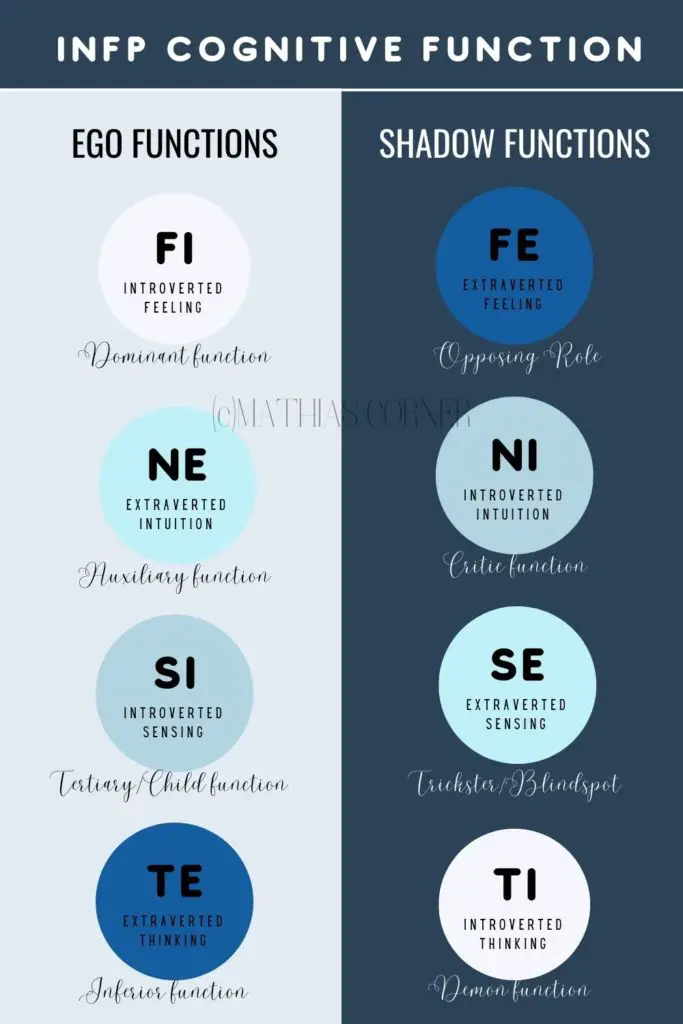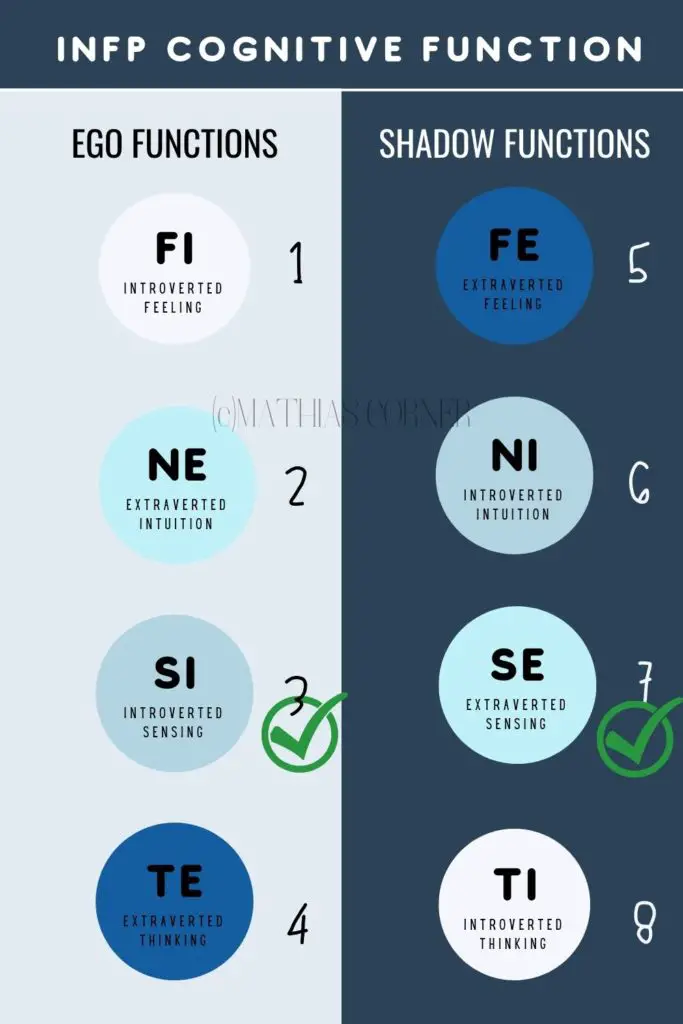INFPs are often described for their forgetfulness or absent-mindedness. “Floaty and clumsy,” as one might say.
But while INFPs appear clumsy, and may always be scolded for forgetting tasks, in reality, they’re not as forgetful as people perceive them.
The truth is, INFPs are walking libraries of memories, too.
Only that, their forgetfulness depends on how much an event touched and stirred their values, beliefs, and emotions.
INFP will remember the events that served a direct impact on their lives. But to tasks that hardly cultivate meaning and don’t bring a challenge to their thoughts, they forget rather quickly.
In this post, let’s tackle how INFPs are both the forgetful types and walking libraries of memories at the same time. How do they forget a conversation quickly, but not the events that happened in the past?
We’ll get into that. Let’s start.
Si and Se Functions: An Overview
See, I’ve read people talking about how “INFPs are forgetful because they have idealistic minds due to extraverted intuition (Ne).” But while our imaginative minds could be a factor, we could explain it further down.
According to Carl Jung’s personality theory, people have 8 cognitive functions that make up their thought processes. An INFP’s cognitive functions are positioned as Fi-Ne-Si-Te-Fe-Ni-Se-Ti.

As we tackle INFP’s forgetfulness, we’ll focus on two: introverted Sensing (Si) and extraverted Sensing (Se) functions.
Here’s a short overview:
If we’re talking about memories, we’re obviously talking about tangible experiences in our life. And when we’re talking about experiences, we’re referring to the Sensing functions.
The introverted Sensing (Si) function allows INFPs to remember significant experiences in the past. Because of this function, an INFP is drawn to recall what they have tasted, heard, touched, smelled, and seen. It’s also the reason why Si-users are nostalgic people.
On the other hand, Extraverted Sensing (Se) allows people to have a quick response time to experiences in the present. With this, Se-users are more in the moment and keen on their physical surroundings.
- Si is the archive, responsible for having a recollection of our past experiences.
- Se is responsible for perceiving the experiences at the current moment.
And well, if we’re talking about the ideals in the future that you haven’t experienced yet, that’s intuition.
(Another point to remember, the Ne-Si and Ni-Se functions work in an axis.)
Now that we have an overview of Si and Se, let’s tackle how this correlates to INFP’s memory storage.
INFP As Walking Library of Memories
Each function has a different behavior, and each position from the 1st to 8th cognitive spot dictates a different role.
INFP’s Sensing (Si) function is in 3rd cognitive spot. Meanwhile, extraverted Sensing (Se) sits farther at the 7th cognitive spot.

What does this imply?
Being on the ego stack, Si-users have an attachment to the memories of past experiences and don’t easily let go.
They’re the epitome of nostalgia. Because INFPs are hardcore feelers and have an archive of memories, they could live a scenario over and over again in their minds, and physically feel it, especially with events that touched their values, beliefs, and emotions.
Say, an INFP likes someone and learns that that person has seafood allergies. The INFP will remember the “aha” moment he felt, how his crush said it, the excitement, and the climate leading an INFP to remember at which month it happened, and with Ne, he may even start idealizing what to do with that information.
Such events become important personal memory, and they will remember them for years, or even for the rest of their lives.
I used to memorize lots of topics for quiz bees, and I was passionate about writing random general knowledge in my notebooks when I was a kid. Certain topics mattered to me, and I’m proud to say that despite the years, I’m still smarter than a 5th grader. Lol.
What’s more, INFPs remember occasions pretty well — their friends’ birthdays, memorable dates, and even the wedding anniversaries of other people.
As long as the situation appeals and matters to them, an INFP will subconsciously draw a picture or even create a movie of that memory in their mind.
This is why fabricating stories is hard when talking to these Dreamers. They paint the images of your words as you speak, store them in their memory archives, and will detect any incoherence easily.
In addition to this, once INFPs get enough exposure to a skill numerous times, the experiential memory sinks in, and they start to move with precision. As Si-users, their old habits die hard, so whenever they solve a problem, you can catch them re-doing the past solutions that worked.
In these cases, INFPs are not forgetful at all.
You may be interested: 15 Things To Describe What It’s Like To Be An INFP
INFPs as Forgetful and Floaty Dreamers
Se is responsible for the experiences in the tangible world. It’s focused on what happens in the now.
Having Se in the 7th cognitive spot makes it INFPs’ Blindspot/Trickster function. As a result, despite INFPs trying hard to get in touch with their physical environment, they still seem to subconsciously detach from it, with their minds drifting back to their inner world.
Long story short, Se-blindspot makes INFPs unaware of their physical surroundings.
Se Blindspot explains why INFPs bump their heads, trip, or get lost in a place they’ve gone to 7 times.
As an INFP, I would be the worst witness to a crime because, most likely, I wouldn’t be able to describe the man’s face or state the color of the shirt he’s wearing (well, unless I intentionally and actively focused on it.)
That said, INFPs become forgetful because they struggle to focus on their physical environment. For them, it’s difficult to remember unnecessary details, especially if it doesn’t interest them.
So, to mundane and unexciting activities, you can expect INFPs to forget them rather quickly.
How to Reduce INFP Forgetfulness
Now, INFPs seem forgetful because they focus less on their surroundings. To avoid these, here are some tips to fix it.
1. Build habits of keeping your belongings in one place.
INFPs are prone to misplacing their keys, phones, and other important gadgets. To avoid this, designate one specific place where you keep your belongings.
From my experience, my phone always lands on the same exact spot on my bed, or my table. It becomes a habit. If I catch myself placing it in a different spot, I grab it immediately and place it where it’s supposed to be.
2. Create a mental checklist.
Make a habit of creating a mental checklist to make sure you’re not missing anything. As for me, here are my checklists, that soon became my habits to avoid being forgetful:
- Before leaving the place I stood at or sat on, I double-check it to see if I had left any of my belongings.
- I have a mental checklist of what to bring every day. For example, I tell myself, “Before I leave my home, I must bring these 5 things: ID, keys, water jug, cards, and cash.” I can forget everything else, but never these five items (because I will not survive the day without these. Lol.)
3. Write notes.
“I don’t have to write it. I’ll remember it.”
Lol, please, no.
With all the rackets happening in your daily life, you have to put them into writing and add detailed descriptions. This helps you remember the exact thoughts you had at that moment.
4. Improve your Se function
Forgetfulness is associated with INFPs’ detachment from their physical surroundings. To live more in the moment, I wrote another blog post about the INFP blindspot and how to improve INFP’s Se function.
Conclusion
All in all, forgetfulness is something that INFPs may dwell on a lot of times. Although it’s a normal part of who they are, we can also improve this aspect by being more in touch with our surroundings.
On the contrary, INFPs’ strong memory is also their strength. They are able to remember important details and specific events for a long time and use them as inspiration for their ventures. This helps them to be good at keeping track of their own lives and also the lives of others.
That’s it about INFP’s forgetfulness. If you have anything to add, put it in the comments below!
I hope you enjoy reading. Thanks! 🙂
-M.Mathias
Was this helpful? If yes, you can buy me a coffee to support the blog. Thanks!
You may also like:
6 Reasons Why INFPs Are Effortlessly Cute
INFP Privacy: 6 Reasons Why INFP Keep Things Hidden
How Can INFP Stop Overthinking?


Not sure if comments simply aren’t being shown or there aren’t currently any, but I’d like to extend my gratitude for this post. I myself haven’t ever been one to give myself a hard time over recalling information that isn’t important in the grand scheme of things, I can see how the inability to recall information can cause others to perceive us as weak when it comes to cognition and all things related. So it can be detrimental to those of us who feel that our value might be diminished by the inability to recall such information.
Your idea of creating a checklist is one that I will definitely take into consideration after I send this off. (specific lists that are created for distance traveled as well as time that will be spent away from home) I think making that list will help make my ability to follow through with trips that I’ve intended to take being sunk into nothing with frustration that comes from attempted on the run logical thought and inventorying items that are typically so easily replace… sounds like a less stressful vacation already. Thank you for your words of understanding and compassion for not only yourself but those who are fortunate enough to have a chance interation with you.
Also wow kudos on the education, automotive technology education as an INFP, mid twenties, and doing so many amazing things. The generations to come will surely have such an amazing asset amongst them, I hope they’re capable of recognizing such. Thanks again…for what? For being you.
Happy to know the information I write actually reaches people who need it. And yes, checklists are awesome! Haha! I appreciate your very nice comment, Matt. Thanks for dropping by. 🙂